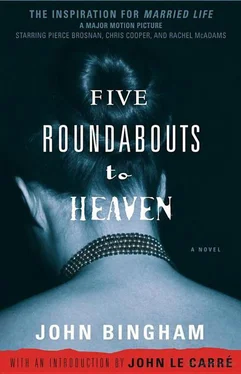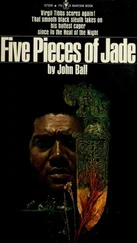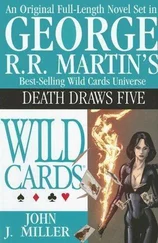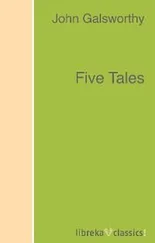John Bingham - Five Roundabouts to Heaven
Здесь есть возможность читать онлайн «John Bingham - Five Roundabouts to Heaven» весь текст электронной книги совершенно бесплатно (целиком полную версию без сокращений). В некоторых случаях можно слушать аудио, скачать через торрент в формате fb2 и присутствует краткое содержание. Жанр: Криминальный детектив, на английском языке. Описание произведения, (предисловие) а так же отзывы посетителей доступны на портале библиотеки ЛибКат.
- Название:Five Roundabouts to Heaven
- Автор:
- Жанр:
- Год:неизвестен
- ISBN:нет данных
- Рейтинг книги:4 / 5. Голосов: 1
-
Избранное:Добавить в избранное
- Отзывы:
-
Ваша оценка:
- 80
- 1
- 2
- 3
- 4
- 5
Five Roundabouts to Heaven: краткое содержание, описание и аннотация
Предлагаем к чтению аннотацию, описание, краткое содержание или предисловие (зависит от того, что написал сам автор книги «Five Roundabouts to Heaven»). Если вы не нашли необходимую информацию о книге — напишите в комментариях, мы постараемся отыскать её.
Five Roundabouts to Heaven — читать онлайн бесплатно полную книгу (весь текст) целиком
Ниже представлен текст книги, разбитый по страницам. Система сохранения места последней прочитанной страницы, позволяет с удобством читать онлайн бесплатно книгу «Five Roundabouts to Heaven», без необходимости каждый раз заново искать на чём Вы остановились. Поставьте закладку, и сможете в любой момент перейти на страницу, на которой закончили чтение.
Интервал:
Закладка:
“May I have a word with you outside, sir?”
“If you wish.”
We walked to the door, and stopped in the passage outside the ward.
“I must ask you what he said to you, sir.”
He stood in front of me, tall and solidly built, healthily red in the face. His hair was cut very short above the ears, his brown eyes were alert and restless. They were the eyes of a person who is accustomed to watch the faces of others for reactions, for the telltale flicker of the eyes, the movement of the mouth which indicates dismay; the eyes of a man accustomed to dominate; eyes which did not waver, but nevertheless moved and roamed over the face of the person to whom he was talking. They were not exactly hostile, but neither were they sympathetic or friendly.
I thought, by way of contrast, of Bartels’ eyes, so full of fear, so filled with silent appeal. I had a swift mental vision of a host of other eyes, hard, implacable eyes gazing at Bartels in the years to come. Police officers’ eyes, warders’ eyes, newspapermen’s eyes in court, warders’ eyes again, fellow convicts’ eyes. Gazing at him as he panicked in his cell, gazing at him in the dock, and again, through the years, in his cell.
I think it was at that moment that I decided to do as Bartels wished.
“It was nothing to do with your investigation,” I answered, and made as if to pass him; but he stood solidly in my way.
“I see, sir.” He tapped his teeth with the chewed end of a pencil.
He made no move. “Well?” I said.
“I take it that in that case you would have no objection to telling me what he said, sir.”
Again I was conscious of his eyes, unbelieving and unyielding, roaming over my face. I react rather brusquely to that sort of thing.
“Actually, I would,” I said abruptly.
“May I ask why, sir?” Police officers always seem to call you “sir” a great deal. It doesn’t mean a thing.
“For personal reasons.” I saw his hard mouth tighten.
“There is an offence known as obstructing a police officer in the course of his duty.”
I laughed, then, at this bluff, and saw his eyes flinch.
“Who is obstructing whom at this moment?” He ignored the question.
“I take it, sir, that you decline to say what he told you, sir?”
We looked at each other for a full ten seconds, eye to eye, in silence. I sighed.
“All right, if you really insist. Do you?”
“It would be helpful, sir.”
The expression on his face relaxed. I could read his thoughts as though he had spoken them aloud: firmness, he was thinking, firmness-that’s what counts. They always come clean.
“He asked me to pray for him,” I said. “He asked me to go into a church and pray for him.”
I went into my darkroom, and stared at the row of bottles, and in particular at the altrapeine bottle. I knew, of course, little about the case, except that it was known that something of a poisonous nature had been placed in Beatrice’s medicine bottle, and that Bartels had apparently put it there. So much the Inspector had told me, edging round the subject in the way the police do when they are not certain of the reliability of the person they are questioning.
Now I could guess what the poison was. Later, when I had become very friendly with the Inspector, and read Bartels’ statement, I learnt where and how he bought it.
It was eight o’clock in the morning when the Inspector had called. He had taken his statement from Beatrice Bartels and he had then come to me. He had asked for the names of any of Bartels’ friends, and mine had headed the list.
I told him a great deal about Bartels, but nothing about Lorna Dickson. I guessed Bartels would not have mentioned her. I saw no reason why I should. Beatrice had not died. There was no call for society to revenge itself for a murder which never took place, or for Lorna to be involved.
Maybe, I was wrong, but that is the way I thought.
I saw the Inspector inching nearer to the subject of a mistress as a motive, and mentally stood back and admired his technique.
First, he asked what particular friends might help to throw any light on the affair. I told him that I did not think any of Bartels’ friends could.
Then he said that doubtless there would be one or two broken hearts in the province if Bartels died, and when I looked at him and pretended to seem puzzled, he said slyly: “Well, you know what they say about commercial travellers, sir. Not that I’d be one to frown on a little innocent larking now and again.”
When that failed, he asked point blank if Bartels had any liaison outside the bonds of marriage. But I was ready for him by then.
“None, as far as I know,” I said, looking him full in the face. “None at all. I always considered him to be devoted to his wife.”
So after my visit to the hospital I stood gazing at the altrapeine bottle in the darkroom, pondering that which Bartels had planned. Although some time had elapsed, I still felt numbed by the shock of events. As yet they made little sense, because I had not yet understood the fatal weakness which was his downfall.
I saw a gentle, kindly little man who had plotted a ruthless, diabolical murder, and the apparent and appalling contradiction bewildered me.
Only later was I able to realize that, in fact, there was no contradiction at all; that it was pity, kindness, and humanity which drove Bartels to his doom. Without those three virtues, without their unbalancing effect upon a sensitive and delicate mind, there would have been no attempted murder.
At that time, however, it all seemed so unnecessary.
I could see no reason why he could not just leave Beatrice; those of us who are in the hotel business are inclined to regard such actions as unfortunate, perhaps, but commonplace enough.
I had not had time, either, to look back over the years and see how the lack of love in his youth had made him so crave it in later years that he was prepared to kill to win it.
After a while, I went out of the darkroom, but I did not take the poison bottle with me. I went out of my flat, and along to the reference room of the public library, and there made certain researches among the medical books.
In the end, I came to the same conclusion about altrapeine as that at which Bartels had arrived. I went back to the flat, and heated up some of the coffee left over from breakfast, and took it into the drawing room.
I drank three cups of coffee, black and very sweet, one after the other, sipping them slowly, and trying to erase certain pictures from my mind, but at the end of the third cup, I knew that I would not succeed.
I told myself that even in prison a man could receive expert psychological treatment. But cold reason could not efface the actualities I had seen. It could not wipe from the heart the distress caused by the wild, pitiful appeal which had flamed in the eyes of Bartels as he lay in the hospital bed, with the red-faced detective sitting by his side: the trapped bird, caught in the legal net, broadcasting, without any attempt at concealment, the waves of its fear, beating against the net, hopelessly and monstrously stripped of all dignity and pride.
What fears were these, and how incomprehensible to the normal person, that they should cause a man to lose his self-respect, cause his eyes to dilate wildly, and his face to flush, and his hand to crush and twist a counterpane!
I, who have been blessed by nature with a more stolid temperament, who have known but little fear in my life, tried in vain to capture a hint of such terrors.
I only knew they existed, because I had seen the look on Bartels’ face. I had seen some such look upon the face of a gravely wounded soldier before the doctor arrived with the merciful dose of morphine.
I saw no such release for Bartels.
Читать дальшеИнтервал:
Закладка:
Похожие книги на «Five Roundabouts to Heaven»
Представляем Вашему вниманию похожие книги на «Five Roundabouts to Heaven» списком для выбора. Мы отобрали схожую по названию и смыслу литературу в надежде предоставить читателям больше вариантов отыскать новые, интересные, ещё непрочитанные произведения.
Обсуждение, отзывы о книге «Five Roundabouts to Heaven» и просто собственные мнения читателей. Оставьте ваши комментарии, напишите, что Вы думаете о произведении, его смысле или главных героях. Укажите что конкретно понравилось, а что нет, и почему Вы так считаете.












